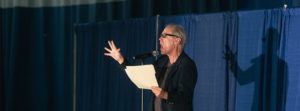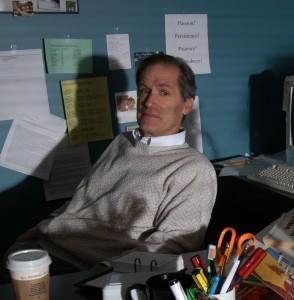Meet CCSN Senior Fellow, Dr. Paul Patton, Professor Emeritus, Department of Communication and Media, Spring Arbor University
Paul has graduate degrees in Counseling and Religious Education, and a Ph.D. in Communication with an emphasis in theater arts from Regent University. He is Professor Emeritus of Communication and Chair of the Department of Communication and Media at Spring Arbor University where he teaches courses in media, popular culture, and theater.
Paul was a pastor until 1993, ministering in the Detroit area at Trinity Church in Livonia. It was at Trinity, while a youth pastor, that he founded Trinity House Theater in 1981, one of the first and now oldest Christian playhouses in North America still in operation. He is the author of over thirty produced stage plays, radio plays, and performance essays.
Several of his plays have been published, including The Celebrity (Heuer Press, 2009), A Meeting in Kansas (Integratio Press, 2015), and A Meeting in Munich (Integratio Press, 2018). Paul is co-author of Prophetically Incorrect: A Christian Introduction to Media Criticism (Brazos Press, 2010).
Listen to Paul’s weekly podcast, “Soul Stirrings: All Things Faith, Communication, and Culture Considered.”
Presentations and Performances
Paul does dramatic recitations of Scripture and from church history. All of the following recitations can be lengthened or shortened to fit the time-frame of any event:
1. “The Psalms and Proverbs”: Paul recites a portion from each of the 150 Psalms, and a portion from each of the 31 chapters of Proverbs. Short portions of commentary help to provide the historical context.
2. “From Every Book of the Bible”: Paul recites a text from every book of the Old and New Testament, along with short portions of commentary help to provide historical context.
3. “Words of the Prophets”: this presentation is a recitation from each of the Hebrew prophets.
4. “Discourses of Jesus Christ”: Paul dramatically recites from various discourses of the Messiah, including the “Sermon on the Mount (Matthew 5-7),” “The Seven Woes (Matthew 23),” and the “Seven Parables” (Matthew 13).
5. “Church History in Quotes”: Paul also offers a one-man show that provides stories and quotes from every century of church history. The overview shares quotes and stories from, among others, Ignatius of Antioch, Polycarp of Smyrna, Origin, Augustine, John Chrysostom, Peter Anselm, Bernard of Clairvaux, Martin Luther, Teresa of Avila, John Calvin, and John Wesley.
The following are biblical themes and spiritual disciplines that Paul presents in traditional sermon format or can be expanded to fit a workshop or spiritual retreat setting:
1. “Stewarding the Stirrings of the Soul”: this presentation, rooted in Psalm 119: 11, invites the listener or workshop participant to consider building the habits that lead to a greater depth of sacred interiority. Paul shares the importance of memorizing what inspires us to “love and good deeds.” Subjects include how to choose what to memorize, how to cultivate memorization success, and the importance of daily review.
2. “Introduction to Theatrical Hermeneutics”: in this presentation, Paul discusses the helpful habit of applying basic principles of “oral interpretation” when reading or reciting the Scriptures. As “hermeneutics” is the science of interpreting texts, the concept of “theatrical hermeneutics” suggests that there are insights about a text that can be gleaned from watching a text “performed” as an act of theater. For instance, in “The Seven Woes,” Jesus Christ’s righteous fury is usually easier to feel when presented as a living confrontation then as read silently. Peter’s sermon in Acts 2 is more easily understood as an impassioned eye-witness account when re-experienced as a sermon then when processed as a quiet read or a sermon series broken up into six pieces.
3. “Your Dance With Pop Culture: Who’s Leading Whom?”: based on Paul’s forthcoming book, co-written with Robert Woods, this presentation invites the participant to begin the practice of monitoring and moderating engagement with pop culture, learning the associated disciplines of strengthening “sacred intentionality,” deepening “sacred interiority,” and embracing “sacred identity.”
Selected Videos
1. Greenville College, chapel presentation: https://www.youtube.com/watch?v=belsl_87_YA
2. Spring Arbor University, chapel presentation, biblical “horror stories,” Oct. 13, 2014, lead-up to Halloween, more on theatrical hermeneutics: https://www.youtube.com/watch?v=belsl_87_YA (begins 25 minutes into video)
3. How pornography harms relationships, building healthy marriages, Spring Arbor University, https://www.youtube.com/watch?v=meX815IUd28
4. Cultivating sacred intentionality, Spring Arbor University, https://www.youtube.com/watch?v=WjwrjitUivA
5. Taylor University Chapel, February 2021, Discussing Sacred Interiority from the book, Everyday Sabbath: How to Lead Your Dance with Media and Technology in Mindful and Sacred Ways (Cascade Books, 2021)
Audio
1. Podcast: Paul Patton — Leading the Dance with Pop Culture Nathan Foster talks with author, playwright, professor and former pastor Paul Patton about the tragic loss of boredom, fear of missing out (FOMO), and the dance …
2. Podcast: Paul Patton — We All Have Secrets To explore this liberating spiritual discipline, Nathan Foster welcomes back Paul Patton, author, playwright, former pastor, and now artist in residence at Spring …
3. Podcast: Paul Patton — Story & The Importance of Memorization Nathan Foster talks again with author, playwright, professor and former pastor Paul Patton about the recurring story of brokenness and redemption found in film, …
4. Renovare Podcast: Ordinary Life with God hosted by Nathan Foster To explore this liberating spiritual discipline, Nathan welcomes back Paul Patton, author, playwright, former pastor, and now artist in residence at Spring Arbor …
5. Renovaré Podcast with Nathan Foster To explore this liberating spiritual discipline, Nathan Foster welcomes back Paul Patton, author, playwright, former pastor, and now artist in residence at Spring …




